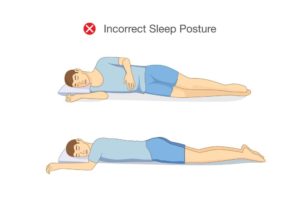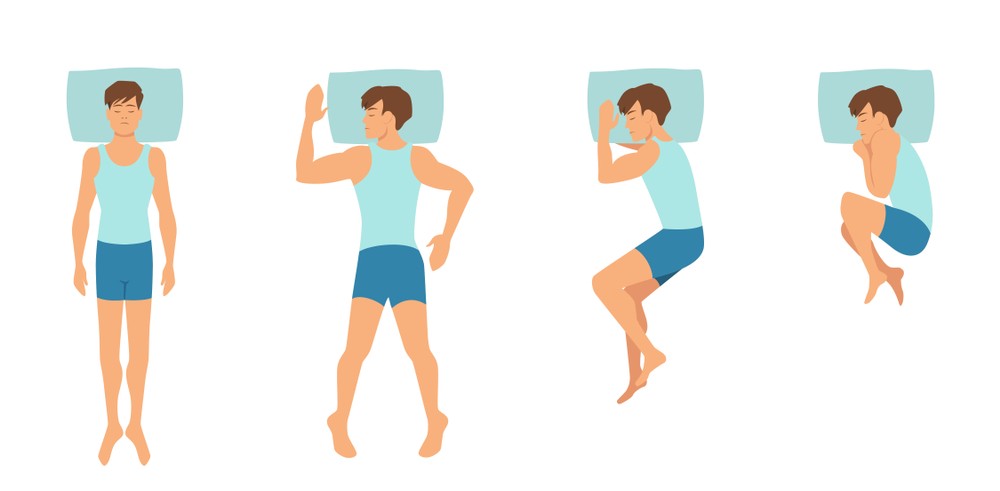 Did someone always remind you to sit up straight at the dinner table when you were a child? Or perhaps you find yourself working in an office where coworkers talk about their favorite ergonomic chair for back support. We learn about posture from a very young age and how it can help improve our appearance, and then as we age, we experience first-hand how improving our posture can help reduce pain. Our posture plays a vital role in how each of our bodies functions. Poor posture can wreak havoc on both your physical and emotional health and well-being. Thankfully, there are steps you can take to improve your posture during the day and also while you are sleeping. Work with your Atlanta chiropractor or physical therapy center to learn how to sleep to fix your posture.
Did someone always remind you to sit up straight at the dinner table when you were a child? Or perhaps you find yourself working in an office where coworkers talk about their favorite ergonomic chair for back support. We learn about posture from a very young age and how it can help improve our appearance, and then as we age, we experience first-hand how improving our posture can help reduce pain. Our posture plays a vital role in how each of our bodies functions. Poor posture can wreak havoc on both your physical and emotional health and well-being. Thankfully, there are steps you can take to improve your posture during the day and also while you are sleeping. Work with your Atlanta chiropractor or physical therapy center to learn how to sleep to fix your posture.
Signs of Poor Posture
 You may tend to think of posture as related to your back, but it can actually affect how you carry yourself from head to toe. One of the most common signs of poor posture is also known as “tech neck.” When you spend a lot of time looking at your phone or working on a computer, you may find yourself leaning your head forward and tilting your chin down toward your chest. This forward head posture can put a strain on your neck muscles that support the spine in your neck. Poor posture can also look like rounded or hunched shoulders, which is when you tend to lean your whole upper body too far forward. Rounded shoulders can lead to back strain, chronic pain, and other issues. Poor posture in your head, neck, and upper back can cause body aches and pains, headaches, muscle fatigue, and spinal issues.
You may tend to think of posture as related to your back, but it can actually affect how you carry yourself from head to toe. One of the most common signs of poor posture is also known as “tech neck.” When you spend a lot of time looking at your phone or working on a computer, you may find yourself leaning your head forward and tilting your chin down toward your chest. This forward head posture can put a strain on your neck muscles that support the spine in your neck. Poor posture can also look like rounded or hunched shoulders, which is when you tend to lean your whole upper body too far forward. Rounded shoulders can lead to back strain, chronic pain, and other issues. Poor posture in your head, neck, and upper back can cause body aches and pains, headaches, muscle fatigue, and spinal issues.
Other signs of poor posture you might not think of can involve your lower back, hips, and knees. If you stand or sit with a drastic sway in your lower back, this can stretch and strain the muscles and spine. Standing or sitting with a sway to your lower back can weaken your abdominal muscles and cause you to stick out your stomach. If you have chronic poor posture, it can also affect the joints in the lower half of your body. Poor posture can put additional stress and pressure on your hips and knees, even impacting the way you walk. Lower back pain, hip and knee joint pain, and conditions like shin splints can all be caused or impacted by poor posture. Proper spinal alignment should include three slight curves at the base of the neck, between the shoulder blades, and at the lower back. Exaggerations of these curves can contribute to chronic pain and other health conditions.
How Sleep Impacts Your Posture
You may not realize just how much the way you sleep can impact your posture. However, even when you are cushioned by your pillows and mattress, you want to maintain proper alignment in your spine. If you are dealing with chronic pain, headaches, or even difficulty getting a good night’s sleep, then your sleep posture may be the culprit. Focusing on good sleeping posture can help relieve aches and pains throughout your day and help you feel well-rested each morning. When you think about it, each night, you spend an average of 7-8 hours in certain positions, so you want to make sure this is helping and not harming your posture and overall well-being. Practice better sleeping posture to improve your quality of sleep and healthy functioning throughout your body. Different sleep positions will offer different benefits, and many people tend to have a preference in the way they sleep. However, switching it up and trying a new sleep position can have a significant impact on how to improve posture and your health.
Common Sleep Positions
 Pay attention to how you sleep at night so you can recognize which of these common sleep positions you choose. Some people only sleep in one position every night, while others may switch it up depending on their mood or comfort level. Sometimes the best sleep position for you is the one that leaves you feeling well-rested and pain-free the next day. Each of these common sleep positions has pros and cons depending on how they impact the normal alignment of your spine.
Pay attention to how you sleep at night so you can recognize which of these common sleep positions you choose. Some people only sleep in one position every night, while others may switch it up depending on their mood or comfort level. Sometimes the best sleep position for you is the one that leaves you feeling well-rested and pain-free the next day. Each of these common sleep positions has pros and cons depending on how they impact the normal alignment of your spine.
On Your Back
Many doctors recommend sleeping on your back to experience the most health benefits. Sleeping on your back may be the best sleeping position for posture because of how it protects your spine by using gravity to evenly distribute weight and pressure on your spine and joints. However, sleeping on your back may not work best for you if you experience snoring or sleep apnea. Sleeping on your back can also aggravate back pain without proper support.
On Your Side
Side sleeping involves lying with your head on your pillow and your legs stretched out or slightly curved. Sleeping on your side is a great option for people who want to reduce snoring. This sleep position can also offer health benefits, like improving digestion and reducing the effects of heartburn. However, sleeping on one side more than the other can put additional strain on your jaw, shoulder, and hip joints on that side. This can lead to stiffness, tightness, and pain on one side more than the other during your day.
In the Fetal Position
Similar to sleeping on your side, the fetal position involves curling your knees toward your chest while side sleeping. The fetal position is actually the most popular sleep position and can help with snoring, lower back pain, and pregnancy-related discomfort. When you sleep in the fetal position, this can help stretch out your spine and help reduce pressure on compressed nerves. However, sleeping in too tight of a fetal position can cause pain and stiffness, especially in your upper back and shoulders.
On Your Stomach
Out of all the sleeping positions, sleeping on your stomach is typically not recommended by doctors. That is because when you sleep on your stomach, it can exaggerate the curve in your lower back and make it difficult to maintain a neutral spine. When you sleep on your stomach, it involves you turning your head to one side or the other, which can strain your neck and lead to chronic pain. While there isn’t one correct posture while sleeping, talk to your doctor if you sleep on your stomach, as this may be contributing to your aches and pains during the day.
Improve Your Sleeping Conditions
 Sometimes, knowing the best sleeping positions for you will involve paying attention to your sleeping conditions, too. Here are ways to improve your sleeping conditions so that you can more effectively improve your posture while sleeping.
Sometimes, knowing the best sleeping positions for you will involve paying attention to your sleeping conditions, too. Here are ways to improve your sleeping conditions so that you can more effectively improve your posture while sleeping.
Check your mattress
Did you know that you should replace your mattress around every 7-10 years? When a mattress starts to sag or becomes lumpy, this can cause you to lose quality sleep and wake up with aches and pains. Check your mattress to see if it is firm enough to provide support for you without causing you to sink too far. A good mattress should provide you with enough firm support that you don’t wake up feeling worse than you did when you went to sleep. The best sleep positions for back pain include your spine being properly supported.
Use pillows for support
Using pillows for support can help significantly improve your favorite sleeping position. If you like to sleep on your back, you can try putting a pillow beneath your knees to help reduce low back pain. If you are a side sleeper or prefer the fetal position, then try sleeping with a pillow between your knees. This can help keep your hips and pelvis open so that your lower spine doesn’t twist uncomfortably. Even stomach sleepers can use pillows for support by making sure your head and neck aren’t too high up or use a pillow under your stomach to help maintain a neutral spine.
Movement before & after sleep
Making time for gentle movements before you go to sleep and after you wake up can help stretch out your muscles and prepare yourself for a better posture. Light stretches before bed can help loosen your muscles so they don’t become tense and stiff while you sleep. Stretching when you wake up in the morning can help ease any pain and stiffness, while also improving your posture. If you are dealing with chronic pain, you can work with a physical therapist to improve your posture while sleeping. Visit your Atlanta physical therapy clinic and learn effective stretches and exercises to help improve your posture day and night.
At AICA Orthopedics in Atlanta, our team of orthopedic doctors, chiropractors, neurologists, and physical therapists work together to provide you with comprehensive care. We will work with you to improve your posture so that you can also improve your quality of sleep. Schedule an appointment at our Atlanta physical therapy office to learn more about how to improve your posture while sleeping and experience the lasting benefits to your overall health and well-being.
